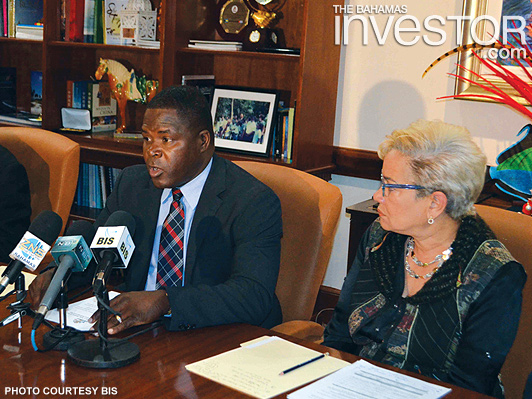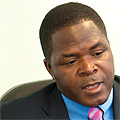| Published: Date: Updated: Author: |
The Bahamas Investor Magazine July 13, 2014 July 13, 2014 Catherine Morris |
As a small island nation, The Bahamas is extremely vulnerable to the vagaries of the worldwide economy. Emerging from the grip of the global recession, the country is now looking to the future and hoping to address systemic shortcomings with the creation of a National Development Plan (NDP).
The 25-year road map will outline a plan for sustainable development in the domestic economy, with the aim of refining government practices, setting investment priorities, establishing operational targets and improving socio-economic factors.
It is an ambitious plan, with an ambitious timeframe. The government and the Inter-American Development Bank (IDB), which is funding the project through a $450,000 grant, hope to have it completed within nine months and ready to roll out from 2015 to 2040.
Teaming up with IDB
The NDP was first discussed in 2012 when the current government took office, according to Minister of State for Investments in the Office of the Prime Minister Khaalis Rolle, whose department is overseeing its implementation.
“We are probably one of the most successful countries in the region in terms of our ability to attract foreign direct investment and tourism, but the downstream benefits have not correlated with what we have achieved,” he says in explaining why there was a need for a new economic strategy. “We still do not have a manufacturing sector that is regionally or globally competitive. The level of imports into the country is still extremely high.”
In the long term, Rolle hopes the NDP will help The Bahamas build a booming domestic business sector, modernize its infrastructure, strengthen the labour force, reduce the need to import technical labour and attract more major investment projects.
“We started off well when we went into independence,” he continues. “We built the institutions that a modern country needed. Since then, we have made improvements, but these were improvements based on a single need, as opposed to a global need for the country. We have not deliberately developed the mechanism by which we want to grow our country. There has to be some level of planning for the country to make significant progress.”
In June 2013, The Bahamas hosted the regional Caribbean Growth Forum, which was attended by IDB president Luis Alberto Moreno and examined ways that small island states could become more economically secure. Shortly after the conference, the Bahamian government and the IDB signed a technical cooperation agreement for strengthening institutional capacity in the Office of the Prime Minister (OPM). This document outlined the need for an NDP and an Economic Planning Unit (EPU), within the OPM, to oversee it. It also provided for a $450,000 grant towards the project, with any shortfall being met by the government.
“The IDB is very familiar with this process; it has done it in many countries,” says Minister Rolle. “It recognized where we were going and offered its support.”
The EPU will carry out feasibility and impact assessments of all investment projects—encompassing foreign direct investment, as well as domestic public and private sector investments. It will also prioritize projects in line with the NDP. The government hopes to create the EPU by the end of 2014.
Phased approach
In January 2014, the government took the first important step to getting the plan underway by beginning the procurement process to find a consulting firm that would assist in preparing the NDP. At press time, no partner had been selected, but the government expects to announce the successful bidder this year, and the work of drafting the plan will begin soon after.
Rolle wants to get all sectors of Bahamian society involved in drawing up the NDP to help his office identify the issues and how to address them. “You have to develop your strategic objectives with a long-term view, but in the short term you have to evaluate where you are and what your resources are,” he says. “We want to ensure that this process is very inclusive. We want to get the views of every segment of society on their future—the business sector, the civil sector, the church, the opposition. Any major institution and all of the business associations that have something to contribute.
“Anyone that cares about the development of this country, and the future of this country should provide all assistance necessary for us to arrive at a comprehensive, integrated plan.”
The government intends to take a phased approach with the plan, setting milestones and targets in five-year intervals. According to a Terms of Reference document drawn up by IDB advisor Dr Nicholas Miles, the first three to five years should consist of identifying projects and funding for them, setting targets and performance indicators and searching out opportunities for investment. The following five to ten years will highlight important and “bankable” programmes.
When it is ready to roll out at the end of the year, Minister Rolle says the government intends to widely publicize the NDP, so that every Bahamian will feel they have a stake in the country’s economic planning.
“We will look at every mechanism available to communicate with the people. This is the first time The Bahamas will ever undertake a fully integrated comprehensive approach to the management of the economy and the planning of the future of the country. It is the single most important inititiative The Bahamas will undertake for our future and everyone must participate.”
IDB and The Bahamas
The government of The Bahamas and the Inter-American Development Bank (IDB) have enjoyed a long and productive relationship. In collaboration with the government, the IDB has put in place a country strategy (CS) to support efforts to enhance growth by improving infrastructure and supporting the development of small and medium enterprises.
The current four-year strategy, which expires this year, is designed to support transformative initiatives of the government. According to the CS document, priority areas include: public finances and management; citizen security and justice; energy; private sector development; and coastal risk management and climate change adaptation.
When it came to power in 2012, the current Bahamas administration negotiated a new CS, which runs through 2017. The government intends to rely on domestic markets to satisfy the bulk of its financing needs, which is expected to total $1.2 billion during the new strategy period. The Bahamas will utilize IDB financing of up to $150 million for “tightly focused transformative interventions that have high government priority and require specialized technical support.”
The financing will place a heavy emphasis on investments, with average annual approvals expected to be $30 million, compared to the annual average of $73 million for 2010-2012. Yearly disbursements are expected to average $34 million, compared to an average of $53 million in previous years.
Additionally, consistent with historical levels, total grant funding for technical assistance and investment grants over the CS period is estimated at $6 million.










